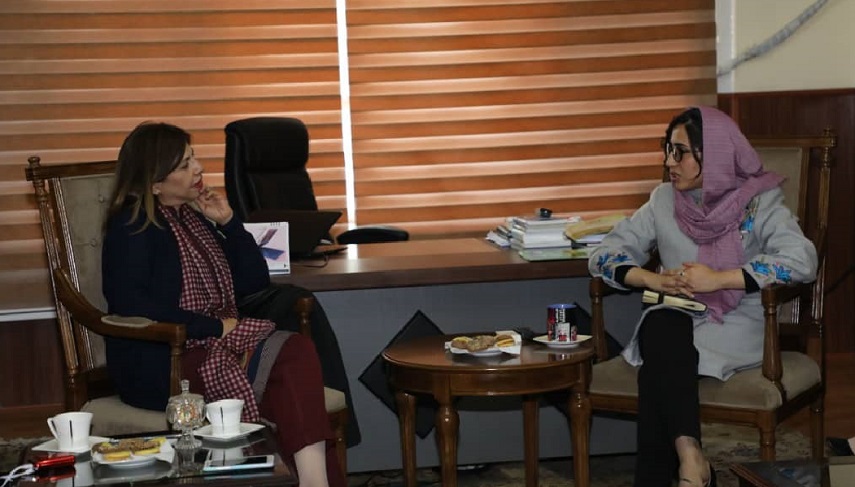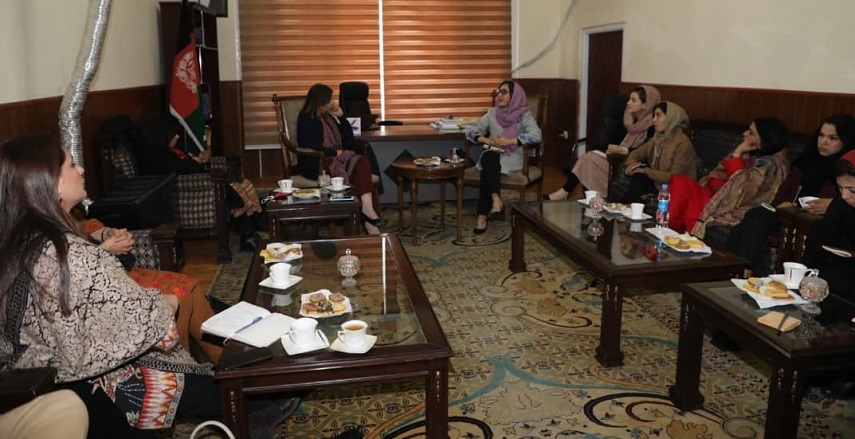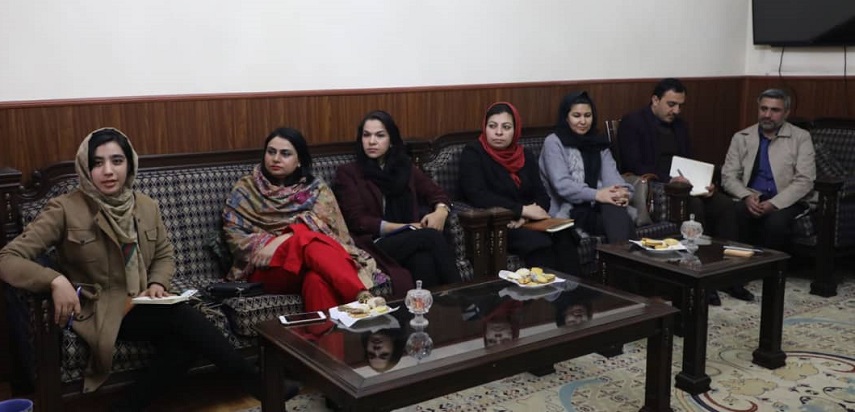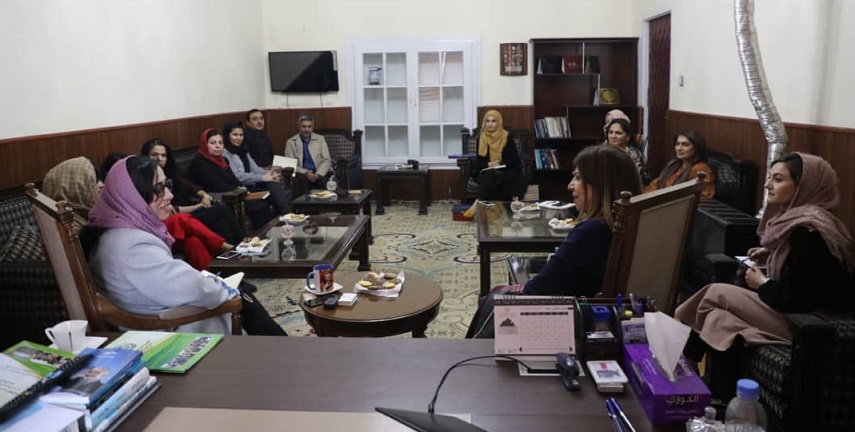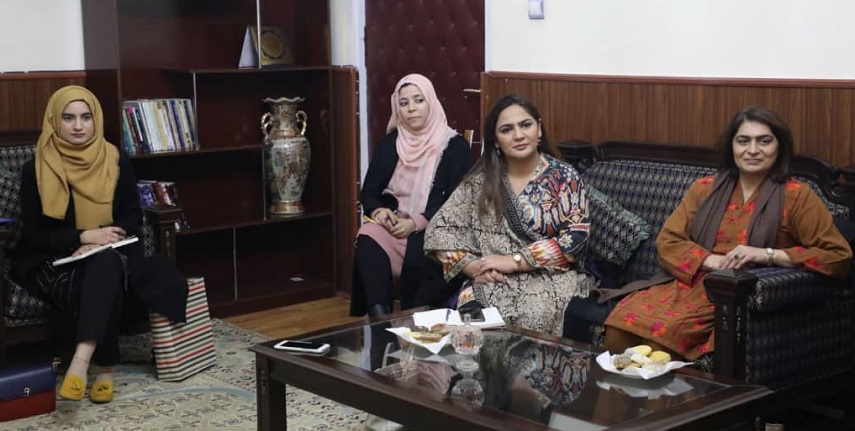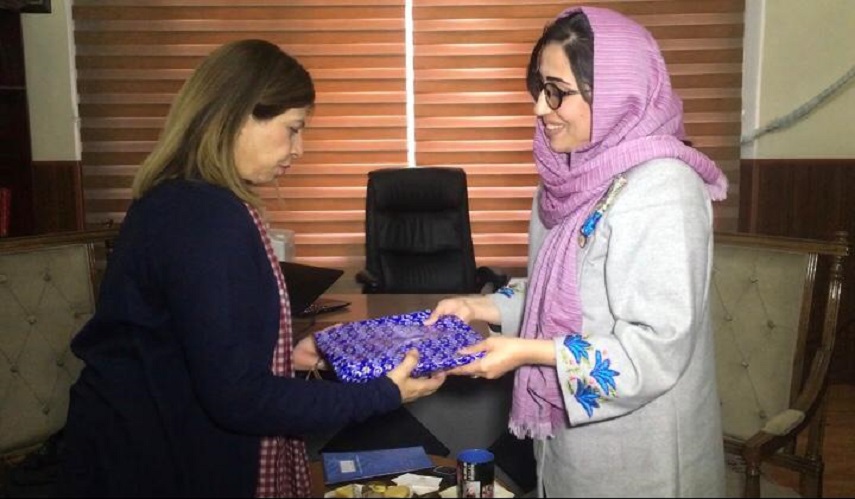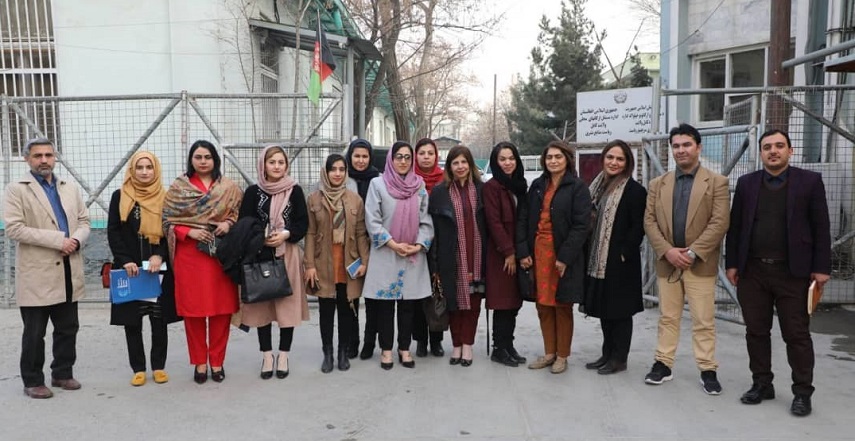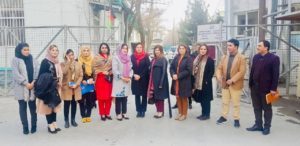On December 28, 2019, Pakistan women-led delegation also met with the Deputy Governor of Kabul on Social Affairs, Ms. Hanifa Girowal at her office in Kabul. Other Afghan notable female leaders in the meeting included Ms. Farida Quraishi; Director of Women Affairs, Ms. Humaira Jalalzai; Director of Teacher Training, Ms. Shahba Sharukhi; civil society activist, and Ms. Shabnam Sarwari; civil society activist working as an education adviser in many organizations. Welcoming the Pakistan delegation, Ms. Hanifa stated that she had lived in Quetta, Pakistan, for seven years herself and found Pakistan to be like her home. She hoped that the delegation would feel like home in Afghanistan as well.
Introducing the governor’s office in Kabul, whose building Ms. Hanifa stated was 100 years old, and the Afghan delegates present, she stated that women’s role in the Afghan society, especially in local governance, had come a long way in recent years. Previously, due to cultural issues and impediments by war lords, it was difficult for women to work in leadership roles. However, President Ghani, during his tenure, gave special concentration to women development, especially in the government as well as in the private sector, which had brought about a huge societal change. She stated that in her view women just need a bit of self-confidence and knowledge and with that they can do everything. Further, she stated that there are five women deputy governors in five provinces of Afghanistan and the agenda is to increase this number to 34, in all provinces.
Ambassador Tasnim Aslam, the head of Pakistan delegation, expressed her pleasure in visiting Afghanistan, saying that Kabul once remained a favorite destination of Pakistanis where her ancestors used to visit over the weekend to watch movies in the cinema. Regarding the changing role of women in the Afghan society, Ambassador Tasnim said that Pakistan still currently does not have a female governor. However, women are otherwise participating more and more in the public life, not just in the economy but also in politics, in Pakistan. In fact, the civil service, which is the backbone of governance in Pakistan, witnessed 55% women entrants in the latest exams.
Further, she stated that there are more women than men in medical colleges and in technical subjects such as business administration, in universities in recent years. Not only that, girls are also doing better academically than boys. In the new generation, many women hold new executive posts, not just in the media but also the telecommunication industry. Hence, the need is to ensure a balance in the society; not have a women-dominated social setup either, nor a completely male dominated social setup. The need is to create acceptance in also those conservative factions of the social strata where there are strong reservations against women taking up leadership positions, she said.
Ms. Hanifa affirmed that it is indeed very crucial to start from the societal level, including in schools, universities, hospitals as well, etc. After the Taliban regime fell, she stated that it started a new chapter of women development in Afghanistan. However, it also brought about many challenges for women when they came to take up leadership positions in offices where the men would not accept them. Giving her own example, she stated that she faced many challenges at first as well, as for a month or two of her joining as the Deputy Governor, none of the district governors would come to her office but talk directly to the governor or other deputy governors who were men. However, she started to require them to report to her and then it gradually changed. She stated that women being in leadership positions then encourages more girls to also be confident about participating in politics, governance and getting education.
Even the Paktia Province, despite being very conservative, has a female deputy governor while the Mayor of the capital city of the Wardak Province, Ms. Zarifa Ghafari, is also a female. Ms. Zarifa Ghafari also struggled for 6 months due to lack of acceptance by her male fellows but eventually got the position and, thus, the situation seems to have improved fairly in this respect for the women, said Ms. Hanifa.
In reply, Ambassador Tasnim, added that in the time of Holy Prophet (may peace be upon him), the Commerce Minister was also a woman. Unfortunately, in some Muslim societies there has been a false narrative that a woman cannot lead and it is associated with some stigma or bad image.
Ms. Hanifa hoped that she would visit Pakistan again and Ambassador Tasnim also warmly welcomed the idea, stating that Pakistan has changed greatly since Ms. Hanifa had obtained her schooling in Quetta. Ms. Hanifa hoped that the peace process works out so Afghan women can safely travel by road to Pakistan as well.
Pakistan delegate and a Senior Development Professional, Ms. Sameena Durrani, recalled that when she came to Kabul in 2004, it was tremendously different from the Kabul she has experienced in this visit, with respect to the active participation of Afghan women that she is seeing in every walk of life in Kabul. Previously, there were very few women that could be seen. It is indeed very heartening to note that a country that has gone through so much has realized how important it is to have women in such positions of power, she said. Comparing the political dynamics in both countries, Ms. Durrani stated that it is unfortunate that political parties in Pakistan are also male dominated; however, most of the legislation passed in Pakistan’s parliament vis-a-vis women-related issues are moved and pushed by women parliamentarians, especially even in foreign policy, which is encouraging. Recalling former President Zardari’s tenure, Ms. Durrani stated that there were seven pro-women laws that were passed during those five years and they were all pushed by women. She affirmed that if women are allowed to be in decision-making spheres, things can definitely change for the better.
Regarding the need for positive curriculum reforms, Ms. Durrani stated that she had been part of curriculum revision committees in Pakistan back in 2005-2010 and there was always resistance from the religious groups towards greater mention of women in books. However, things have changed now and the present curriculum, she said, has incorporated gender as a main feature in the textbooks in Pakistan and children from the very beginning read about leading women, which was earlier missing. Regarding this, Afghan civil society activist, Ms. Shabnam Sarwari, who had worked with curriculum for five years, stated that if one compares the books of 2019 with the books of 2004, there is a tremendous change in Afghanistan as well. Previously while the children’s textbooks would show war heroes as role models or children’s book characters would be having guns, now the books depict characters that like to read, write, play and go to schools. The curriculum in the schools in Afghanistan is also undergoing reforms, she said, in various subjects as Math, Geometry, and so on, up to grade 11.
Ms. Hanifa further added that in Afghanistan students study between 15 and 16 subjects from grade 6 onwards to grade 12 which is very overwhelming and the ministry of education is working on decreasing these subjects to 5-10. It is now attempting to reform the education system and make it like Pakistan’s where after class 10, students can join college and choose between subjects. She added that the deputy minister for education is also a female which can work favorably with respect to introducing pro-women curriculum in the education sector.
Ms. Hanifa further stated that there is also a technical education entity which is being led by women where Ms. Nadima Sahar is the General Director for Technical Education Studies. In that domain, there are several technical schools all around the country, with 14 schools alone in the 14 districts of Kabul. While the entity is separate now from the Ministry of Education and being led by women, it is for the technical development of both men and women. On a question regarding whether the schools are separate for girls and for boys, Ms. Hanifa stated that there are schools in Kandahar, Paktia and Khost provinces where girls and boys study in segregation; however, in Kabul, they study together as there are co-education schools. Ms. Hanifa though noted, as suggested by a Pakistani delegate, that certainly many families hesitate to send their daughters to schools for cultural reasons which discourage the mixing of boys and girls in schools, hence, noting the recommendation that separate technical fields schools for girls should be created in Afghanistan so girls from all backgrounds can avail these opportunities.
On a question by an Afghan delegate, Ms. Humaira Jalalzai, regarding educational opportunities for Afghan youth in Pakistan, Ambassador Aslam stated that Pakistan’s universities, schools and colleges are open for Afghan students. Apart from those Afghans who live in Pakistan and are already enrolled in Pakistani institutes, Pakistan has also offered 3000 scholarships to Afghan youth and there are many fields that they have the option of applying in.
When asked regarding the objective of the CRSS’ delegation in Kabul, Pakistan delegate, Ms. Samina Durrani, stated that whenever there are meetings and peace talks, women are generally missing in the formal setups as well as in the informal setups. Hence, one of the efforts that CRSS is making is mainstreaming women in the discourse of peace and security because as women in Afghanistan are in leading position, they are also in some leading positions across many sectors in Pakistan. Somehow, however, when the formal talks take place, the women perspective is absent in both countries. Ms. Durrani said that the present visit, and many more to come, is a good opportunity for all women to share their perspectives vis-a-vis peace, education and women’s rights. To this the Afghan participants stated that as both countries are neighbors, their women should connect their efforts for peace.
Pakistani delegate, Ms. Hina Mansab, also added to this, saying that as there is a huge market in Europe for handicrafts, it would be a good idea if the women in both countries can collaborate their efforts in setting up small handicraft ventures jointly. She further suggested that women in both countries can be given training on how to improve the finishing of their goods to meet the international standards.
Ambassador Tasnim Aslam further added that the delegation is not on a political agenda – the purpose of delegation, as part of CRSS ongoing efforts in improving bilateral relations – is to connect and create a network of women across the border, tapping common interests and linking up based on the tremendous convergences that exist, including the value systems, religion and social conditions. As a result of these, she said, women on both sides face similar challenges and, hence, can share them and collaborate in businesses, entrepreneurship, education, the struggle for rights, and so on. She further said that business is going on both sides between businessmen of Pakistan and Afghanistan and as per the Pakistani Embassy in Kabul, 1500-2000 business visas are issued every day, however, these are all men. There is now a need to focus on businesswomen.
Ms. Hanifa suggested that hopefully a delegation of businesswomen will soon come to Pakistan and the women of the two countries can then join their efforts in creating finished goods which meet international standards, and organize joint exhibitions as two friendly neighboring countries.
To the invitation by Ambassador Aslam to visit Pakistan, Ms. Hanifa stated that she would be glad to visit, affirming that while there may be political issues between the two countries, it is people to people relationship which we can never ignore. “I still find Pakistan as my home and feel really connected to the country and its people, and would definitely visit again,” she said.

